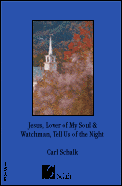|
|
 |
Jesus, Lover of My Soul &
Watchman, Tell Us of the Night
Composer Carl Schalk
Texts "Jesus, Lover of My Soul," Charles Wesley, 1740
& "Watchman, Tell Us of the Night," John Bowring, 1825
Voicing SATB, organ, brass quartet, timp., opt. cong.
Topics Christian Life, Eternal Life, Grace, Walk with God
Church Season Advent ("Watchman, Tell Us")
Length 3' 15" Price $2.50 (U.S.) Released 5/00
Catalog no. 425-845 Difficulty Moderately difficult
Discography Fill the World with Loudest Praise, St. Paul's Chamber Choir, Robert Brewer, conductor (Selah 520-425)
Order now!
Other editions 425-846--Cond. Score/Inst. parts Price $20 (U.S.)
Order Score and Parts


Read the history of these hymns
Download a review copy of this anthem
 Description Description
Two works in one! Schalk's concertato on ABERYSTWYTH is provided with the two texts most often associated with Parry's tune. The arrangement is rock-solid and powerful, employing SATB, organ, brass quartet, and timpani. It may be performed effectively either with or without congregational participation.
Texts
"Jesus, Lover of My Soul"
Jesus, Lover of my soul, let me to thy bosom fly,
while the nearer waters roll, while the tempest still is high:
hide me, O my Savior, hid, till the storm of life be past;
safe into the haven guide, O receive my soul at last.
Other refuge have I none, hangs my helpless soul on thee;
leave, ah! leave me not alone; still support and comfort me!
All my trust on thee is stayed; all my help from thee I bring;
cover my defenseless head with the shadow of thy wing.
Plenteous grace with thee is found, grace to cleanse from ev'ry sin;
let the healing streams abound, make and keep me pure within.
Thou of life the fountain art; freely let me take of thee;
spring thou up within my heart; rise to all eternity.
--Charles Wesley, 1740
"Watchman, Tell Us of the Night"
Watchman, tell us of the night, what its signs of promise are.
Trav'ler o'er yon mountain's height, see that glory-beaming star.
Watchman, does its beauteous ray aught of joy or hope foretell?
Trav'ler, yes; it brings the day, promised day of Israel.
Watchman, tell us of the night; higher yet that star ascends.
Trav'ler blessedness and light, peace and truth its course portends.
Trav'ler, will its beams alone gild the spot tha gave them birth?
Trav'ler, ages are its own, see it bursts o'er all the earth.
Watchman, tell us of the night, for the morning seems to dawn.
Trav'ler darkness takes its flight, doubt and terror are withdrawn.
Watchman, let thy wand'rings cease; hie thee to thy quiet home.
Trav'ler, lo, the Prince of Peace, lo, the Son of God is come!
--John Bowring, 1825.
History of these hymns
Charles Wesley, "Jesus, Lover of My Soul"
This hymn is one of the most popular written by the prolific Charles Wesley (17071788). Charles and John Wesley (17031791), the brothers whose evangelical vision and tireless efforts shaped 18th-century Methodism, left a rich legacy of hymns with enduring appeal. They encouraged congregational singing and provided their followers with songs that gave vent to the deepest emotions of participants in the 18th-century evangelical awakening. The vast majority of the Wesleys hymns came from the pen of Charles.
The brothers were reared in an Anglican manse and deeply influenced by their capable mother, Susannah, and their rector father, Samuel. Educated at Oxford, they took Anglican orders and sailed to the American colonies to undertake a mission in Georgia. In Savannah, they compiled their first hymnal but met with no marked religious success. They returned to England, deeming their missionary efforts a failure. In the third week of May, 1738, both brothers experienced dramatic awakenings to faith-in John Wesley's famous description, their hearts were "strangely warmed." A new commitment to evangelism and holiness marked their future efforts. Charles Wesley immediately turned to poetry to express his religious emotions and urge others on to deeper commitment. He wrote his first hymn a day or two after his conversion and dictated his last on his deathbed.
"Jesus, Lover of My Soul" first appeared in the Wesleys' 1740 publication, Hymns and Sacred Poems. It is based on a text in the Apocrypha, Wisdom 11:26 ("Thou sparest all things, for they are thine, O Lord who lovest the living"), and also borrows from Matthew Prior's poem, "Solomon," published in 1718. Its point is simple: Jesus is the soul's only satisfaction: "Thou, O Christ, art all I want/More than all in thee I find."
Charles Wesley wrote five stanzas for this hymn. The third is now generally omitted:
Wilt Thou not regard my call?
Wilt Thou not accept my prayer?
Lo, I sink, I faint, I fall!
Lo, on Thee I cast my care;
Reach me out Thy gracious hand!
While I of Thy strength receive,
Hoping against hope I stand,
Dying, and behold I live!
John Wesley disliked the intimate language of his brother's poem, once declaring his effort "in all the hymns which are addressed to our blessed Lord, to avoid every fondling expression, and to speak as to the most-high God." When he edited the definitive Collection of Hymns for the People Called Methodists (1780), he omitted this popular hymn. His objections failed to diminish its appeal. Just ten years later (1790), American Methodists included it in their hymnal. In 1807, it appeared in an American hymnal published by Roman Catholics; in 1870, the Reorganized Church of Jesus Christ of Latter-day Saints opted to put it in their hymnal. Well over 2,000 hymnals published in the United States have included "Jesus, Lover of My Soul."
This hymn has been set to various tunes. The most popular in the United States are REFUGE, MARYTON and ABERYSTWYTH. In Great Britain and the United States, "Jesus, Lover of My Soul" is perhaps most often sung today to ABERYSTWYTH, a haunting minor melody by Joseph Parry (18411903). A native of Wales, Parry was an ironmaster who spent some time in the United States. He later became a professional musician and disciplined himself for a time to compose one hymn tune every week. He wrote ABERYSTWYTH while visiting the seaside town of that name in 1879.
John Bowring, "Watchman, Tell Us of the Night"
Sir John Bowring wrote "Watchman, Tell Us of the Night" in 1825 as a poem rather than for use as a hymn. He first found it used as a hymn early in the 1830s when he attended a meeting of American missionaries in Turkey and heard them sing it. Bowring was born in Exeter, England, in 1792. The son of a wool manufacturer, he worked briefly with his father and also studied modern languages. As a young man, he became a follower of Jeremy Bentham and a contributor to the Westminster Review. In 1835, he entered the House of Commons as a Radical. He began a distinguished career of government service abroad in 1849, concluding as Governor, Commander-in-Chief, and Vice-Admiral of Hong Kong and its dependencies, and Superintendent of Trade east of the Ganges. Knighted in 1854, he published widely and devoted himself to reform causes until his death in 1792.
There has been debate about how to classify Bowring's religious inclinations. A member of a Unitarian congregation, he manifested strong affinities for evangelical piety. While several of his poems gained wide acclaim as hymns (especially "Watchman, Tell Us of the Night" and "In the Cross of Christ I Glory"), others have been used almost exclusively by Unitarians. |




